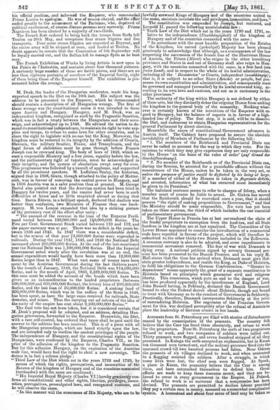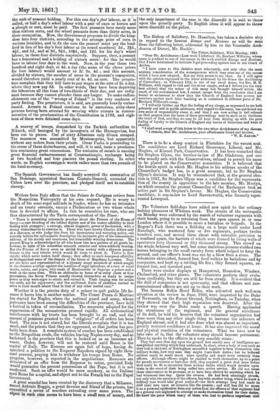Accounts from St. Petersburg are filled with stories of disturbances
caused by the emancipation of the peasants. The country folk believe that the Czar has freed them absolutely, and refuse to work for the proprietors. Near St. Petersburg the serfs of two proprietors refused to work, and two companies of soldiers were called out. Thirty peasants were flogged, and seven hundred stripped of all they possessed. In Kaluga the serfs accepted an explanation, but in Kasen ten thousand men turned out, and the military governor fired into the unarmed crowd till two hundred persons had fallen. Near Odessa the peasants of six villages declined to work, and when sentenced to a flogging resisted the soldiers. After a struggle, in which 'some lives were lost, the chief men were flogged. At Sposk, a place in Kasen, the peasantry believe that the Czar is among them, and have entrenched themselves to defend him. Great efforts are made to keep these emeutes secret, and they are be- lieved to occur in every government in the Empire. In Poland, the refusal to work is so universal that a compromise has been devised. The peasants are permitted to decline labour provided they pay a certain sum in money, assessed on a somewhat complicated system. A homestead and about four acres of land may be taken as the unit of peasant holding. For this one day's fool labour, as it is called, or'half a day's wheel labour with a pair -of oxen or horses and a plough or cart, must be paid. The foot peasants have rarely more than sixteen acres, and the wheel peasants more than thirty acres, in ,their occupation. Now, the Government proposes to divide the king- dom into four districts, according to the average price of corn in various localities, and to fix the sum the peasant must pay the land- lord in lieu of his day's foot labour at (in round numbers) 3d., 31d., 4d., and 5d., and at Sd., aid., bold., and 12d. for his day's wheel labour, in these four districts respectively. Suppose, then, a peasant has a homestead and a bolding of sixteen acres : for this he would have to labour four days in the week. Now, in the year these two hundred and eight days, at 4d. a day (the mean of the above prices for foot labour) would amount to 3/. 9s. 4d. ; and this amount, divided by sixteen, the number of acres in the peasant's occupation, would therefore yield a yearly rent of 4s. 44. an acre. The proprie- tors complain that they will have to pay wages at the rate of 3s. a day, where they now pay 8d. In other words, they have been depriving the labourers all this time of two-thirds of their due, and are indig- nant because they cannot plunder them any longer. To make enfran- chisement one of the "wrongs of Poland" is the very madness of party feeling. The proprietors, it is said, are generally heavily embar- rassed. Arrests in Poland continue to be numerous, sixty-three persons having been arrested for wearing white cravats in eomme- moration of the proclamation of the Constitution in 1792, and eigh- teen of them were detained some days.































 Previous page
Previous page